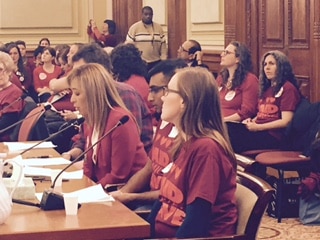We Need Laws that Support Our Families: DC Paid Leave Hearing

by Ellen Bravo
The hearing room at the DC City Council was packed on February 11, the witness list longer than council members could remember having seen before. All but a handful of people had come to testify in support of the Universal Paid Leave Bill. They ran the gamut in age, gender, race and ethnicity, income and occupation. The reasons they’d needed leave varied – some to care for a new baby, others for a beloved parent or partner or for their own health. But a common theme echoed throughout their testimony: we need laws that support workers and their families. Otherwise, we violate our most basic values of family and economic security.

Alonzo Guardado named the problem early on in the session: “I don’t see laws that support me.” He’d put in ten years at the same restaurant when he had an accident and needed time to heal. Alonzo was told he’d get paid for the time he was out, but when he got back, there was no check. “Please pass this bill for me and for all workers,” he told the Council members.
Rachel Dubin invoked higher law. When her mother was terminally ill, Rachel, who is deaf, couldn’t afford to take time to go back and forth to Baltimore to care for her, the person whose perseverance and love had helped Rachel learn to speak after a cochlear implant. “The fifth commandment tells us to honor thy father and mother,” Rachel said. “This bill would allow all of us to fulfill that.”
Travis Ballie spoke as a son whose mother had had to go back to work within two days of his premature birth and leave him in the NICU. “Who can imagine leaving a baby in the NICU?” he asked. “But which bill should my mother not have paid?”
The audience was not allowed to clap, but there were many nods, or gasps, or tears shed when someone reminded the elected officials that no six-year-old should have to sit in a hospital room alone for weeks on end, or no father be forced to rush from work to the hospital without sleeping to care for a son who’d been shot.
Chandra Davis was among the many witnesses who described what it’s like to take leave without pay. A deli clerk at Giant, Chandra’s unpaid maternity leave lasted seven weeks; money for diapers and wipes ran out after one week. Food for her family consisted of “lots of hot dogs and French fries from the Dollar Store.” Going back early meant she had to stop breast feeding her baby. “Because I have no paid leave, I have had to choose between taking care of my family physically and taking care of them financially,” she testified. And, like so many that night, she asked, “How is that okay?”
Others testified about the consequences on their own health. For Ke’sha Scrivner, who was diagnosed with stage 4 breast cancer, lack of paid leave meant spending her lunch time taking the bus to the hospital for chemo and later radiation, and then taking the bus back to work. “Instead of sitting in excruciating pain,” she told the Council, “I need to be able to be home and heal without worrying about how I’m going to pay my bills.”
Linday DuPertuis, who faces a liver transplant, worries about her own health. But also, she said, “Every day I worry this will financially ruin my family.” For her, the universal paid leave bill represents hope. Her message to the City Council: “Please keep my hope alive.”
Benefits for the District
The majority of business owners who testified spoke in support of the bill. Roger Horowitz of Pleasant Pops, for example, described how much he would love to offer paid leave to his employees but doesn’t have the cash to do it. This bill would make that possible – a boost for staff and customers alike.
The council also heard from social workers, teachers, the head of the DC chapter of the American Academy of Pediatricians, the director of the National Hispanic Council on Aging, the head of the Black Women’s Roundtable and other experts about the benefits of paid leave: helping the brain development of infants, the educational success of children, the mental health of community members, the independence of seniors, the involvement of dads, and the reduction of racial and gender disparities.
Several witnesses testified that passage of this bill would be the deciding factor in staying in or moving to DC. As Jessica Lott put it, instead of moving back to the Midwest to raise a family, she and her husband would invest in “what would be the most family-friendly city in America.” Preston Van Vliet praised DC for being one of the best places to live for trans people and urged the Council to make sure it remains so by including all families in this bill, and all medical conditions.
Lobbyists for the restaurant association and others argued to stop the legislation or significantly narrow it. But they could not counter the evidence of the need for and benefits from this bill. What each supporting witness could not change on their own, they may have achieved through the combined power of their voices, thanks to the DC Paid Family Leave Coalition: the ability to provide for their loved ones and care for them, made possible by a paid leave fund with enough time, affordability and job protection.